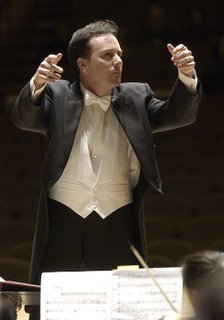 Ryan Brown, director of Opera Lafayette |
At this point in his life Handel's health was in an extremely poor state, a subject documented by Handel specialist David Hunter (see the article by Stephanie Pain in New Scientist this month). Coinciding with the failure of his operatic ventures, Handel's binge eating and ballooning weight contributed to many health problems, a paralysis of his hands, increasing irritability and depression, perhaps caused by lead poisoning from excessive indulgence in lead-laced food and wine. It is not clear what benefit was gained from Opera Lafayette cutting the third part of the oratorio, Il Moderato, which adds up to only about 20 minutes of music, other than trying to focus on Milton's poetry, although exclusively in its diced-up form, pieced together by Jennens in the libretto. Is it possible that Jennens at least partially intended the message of moderation for Handel himself? One could certainly read the following lines from the bass's opening pieces that way:
Hence, boast not, ye profane,One of the likely concerns was to avoid the score's excessive longueurs, and like any Handel score, there are some snoozers in L'Allegro. The inclusion of recitations of the libretto text was more laudable in intent than in practice, as the actors invited gave at best mediocre recitations. Omitting them would have left more than enough time to give a complete performance of the work. The only encore offered was the luscious duet As Steals the Morn, from the deleted third part, featured on the Handel disc of the same name by Mark Padmore two years ago, leading one inevitably to wonder if the performance would not have been more worthy with the complete score.
Of vainly-fancied, little-tasted pleasure,
Pursued beyond all measure,
And by its own excess transform'd to pain. [...]
Sweet temp'rance in thy right hand bear,
With her let rosy health appear.
Anne Midgette, Everybody's Talkin' in 'L'Allegro' (Washington Post, April 6) |
Soprano Ann Monoyios replaced Kirsten Blaise, still listed in the program but described as "ill and unable to perform" in an insert, but the change was not all that recent. Monoyios sang well, although struggling with flatness throughout the evening (especially bad with the solo cello in But oh, sad virgin). She shone in the extended duet with Colin St. Martin on flauto traverso (Sweet bird, that shun'st the noise of folly), where the avian warblings of both were elaborated with charming embellishments. Baritone David Newman, cheated of some of his already smaller portion of music (cut with the third part), sang with a tone that matched the earnestness on his face. The orchestra was generally fine, under the inimitable style of conductor Ryan Brown, all pointed fingers and marching in place. The chamber chorus sang with flair and stylistic subtlety, with the exception of a prominent false entrance in the bass section during Populous cities please us then.
Next year Opera Lafayette will celebrate its fifteenth season, with concerts that include Charpentier's Les Florissants (October 19, Kennedy Center Terrace Theater), Gluck's Armide (February 1, 2010, for the company's debut in the KC Concert Hall), and Philidor's Sancho Panza (May 24, 2010, Terrace Theater) in its American debut.
No comments:
Post a Comment